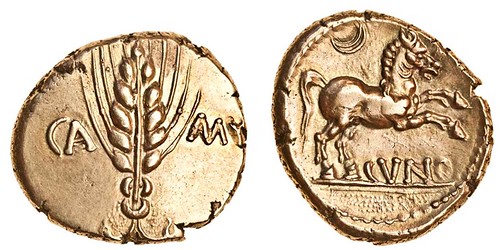
PREV ARTICLE
NEXT ARTICLE
FULL ISSUE
PREV FULL ISSUE
REPEAT AFTER ME: GRAIN = CORN; CORN = MAIZE
Last week Greg Meyer wrote: Maybe I am confused.... I thought corn was a new world introduction to Europe after 1492.... But this sale is identifying Celtic coins with a "Classic" layout described as corn.... the image with the intercalating hairs sticking through the grains looks like classic wheat to me...
Well, I got schooled big-time by E-Sylum readers, with the first response rolling in Sunday night shortly after publishing the
issue. -Editor
Jon Radel writes: American English speakers badly astray. Such as "company" being a plural noun and "corn" being any old grain, most frequently the predominant grain in a given area. So in England "wheat" is "corn" and is not to be confused with that new world "Indian corn" or "maize". Bruce W. Smith writes: I have run into this question before. I had always heard that corn was a product of the New World (along with potatoes). But I have seen references to corn depicted on ancient coins. And in medieval England there was an important event resulting in the "Corn Laws". It turns out that the word "corn" was in the English language long before the New World was discovered, as a reference to any kind of grain. Thus we have barleycorn and peppercorn. The grain shown on ancient coins is usually wheat. In the New World, explorers discovered what they called "Indian Corn". In the United States this was shortened to simply "corn". To avoid confusion, we should use the proper name for this product, which is "maize". Mark Brown writes: The use of the word ‘corn’ precedes 1492. In fact it goes back at least to 452. It means simply ‘grain’. The OED notes that the term is often used locally to mean the sort of grain predominant among local crops, thus for ‘wheat’ in some parts of England, for ‘oats’ in others, and for ‘maize’ or ‘indian corn’ in the U.S. Denarius Thrymsa writes: Greg Meyer expressed some confusion about the use of the word “corn” to describe a stalk of what is obviously wheat on a Celtic gold coin (this was in the article on the sale of the Celtic coins from the Geoff Cottam Collection, specifically Lot 373, a gold Stater of Cubobelin— who, as it happens, was the basis for the “Cymbeline” of Shakespeare’s play, but that’s another story). “Corn” is actually an Old English word that refers to grain generally— in England itself, it usually means “wheat,” the primary grain of England, while it usually means “oats” when referring to Scottish grain, and it usually means “barley” when referring to grain in Southern Italy (as on the coins of Metapontion). When the English settlers came over to the New World, they used “corn” to refer to the most common grain they encountered on this side of the pond. The English back in England usually call that yellow grain “maize,” borrowing from the Spanish who took it from one of the native languages. The Geoff Cottam Collection was being sold by a British firm, and they used "corn" in the usual British sense of the word. You see the same thing in the Spink Coins of England and the United Kingdom catalog, see #'s 281, 283, 286, etc. Bob Van Arsdell writes: In Britain, wheat is commonly referred to as "corn". The wheat ears on Ancient British coins are always referred to as "corn ears". My website conforms to British practice. So what do they call American corn? - Maize To read the complete article, see:
Thanks also to Steve D'Ippolito, Chip Howell, Gary Beals, Paul Schultz, and Paul Hybert. -Editor
To read the earlier E-Sylum article, see:
Wayne Homren, Editor The Numismatic Bibliomania Society is a non-profit organization promoting numismatic literature. See our web site at coinbooks.org. To submit items for publication in The E-Sylum, write to the Editor at this address: whomren@gmail.com To subscribe go to: https://my.binhost.com/lists/listinfo/esylum All Rights Reserved. NBS Home Page Contact the NBS webmaster 
|